What is the Future of Virtual Wards?
Lloyd Price
APRIL 7, 2023
Privacy and security concerns: Virtual wards involve collecting and sharing patient health data electronically, which raises privacy and security concerns. Health equity: There is a risk that virtual wards may widen health inequalities if some patients do not have access to the technology or support they need to participate.












Let's personalize your content